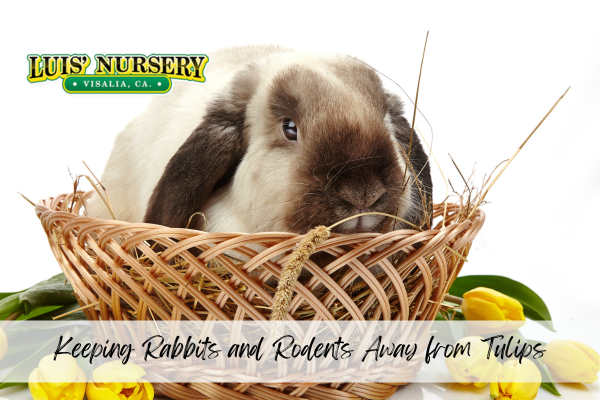We plant tulips in the fall and patiently wait to see them bloom in our Visalia gardens announcing the arrival of spring. These bulbs shoot up and bring the first signs of spring color to our landscape. Unfortunately, we aren’t the only ones that appreciate tulip bulbs. Rabbits and rodents appreciate them, but for very different reasons. If you would like to avoid the disappointment of finding out that hungry pests have torn up your bulbs there are a few things that you can do to protect them.
Know the “tulip capers“
It’s important to identify the specific “tulip capers” or pests that are eating your bulbs. Knowing the specific wildlife that is using your garden for lunch can help you know the best kinds of deterrents to use. Deer, moles, voles, mice, rabbits, squirrels, and chipmunks are just a few of the “tulip capers” to keep in mind.
What type of repellents can you use?
If you’d like to keep your bulbs safe you can use a variety of methods to protect them. To protect the tulip bulbs that you already have you will just need to keep on top of it as the methods aren’t foolproof. Time and weather can reduce the effectiveness.
- Cayenne pepper – If you soak the bulbs in cayenne prior to planting it would increase the effectiveness, but if your bulbs are already in the ground, you can use cayenne to discourage rodents from nibbling. The taste and smell of cayenne pepper will repel them.
- Blood meal – This is a win-win for your garden. Blood meal will keep away small rodents and add nutrients to the soil. Bonus! The only downside is that it can attract raccoons.
- Predator hair and urine – You can use predator urine and hair to keep pests away from plants. You can find chemical versions of them as well.
Prevent future issues
If you are too late to prevent this year’s bulbs, you can plan for the future. There are a few methods to help deter rodents:
- Mix deterrents into the soil – When planting your bulbs you can mix in 10 percent stone dust, sharp-edged gravel, or another gritty material into the soil. Rodents will be discouraged against digging into the soil and going after the bulbs.
Chicken wire – Even though some animals can dig underneath chicken wire it still is an easy method to keep animals out. Rabbits can be deterred by 4-foot-tall chicken wire that is buried 10 inches deep. Make sure that it is bent in an L shape away from the garden and the mesh is one inch or smaller.
Shake it up and change out the tulips
If you’re not overly attached to having tulips you can always change it up and plant something that critters won’t bother, or you can interplant some unsavory options that will provide a measure of safety for them. Daffodils, snowflakes, ornamental onions, crocuses, and grace hyacinths are a few tulip protectors.



